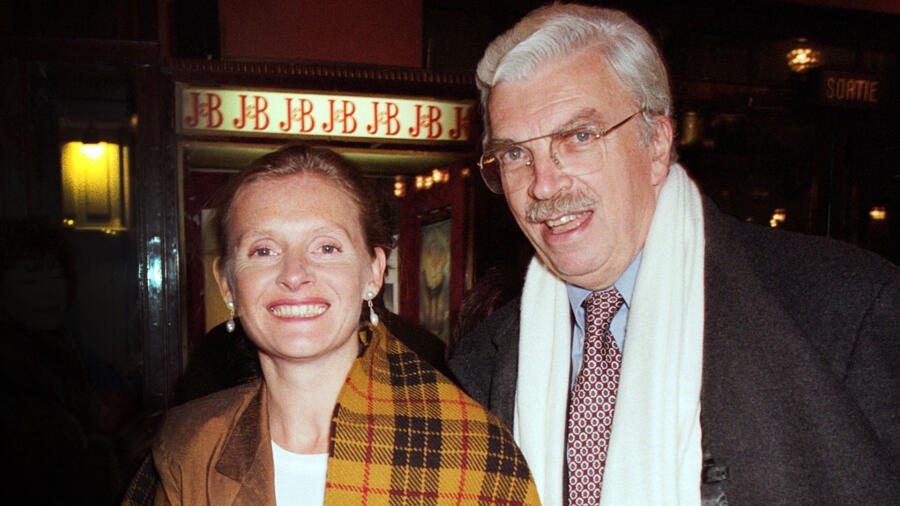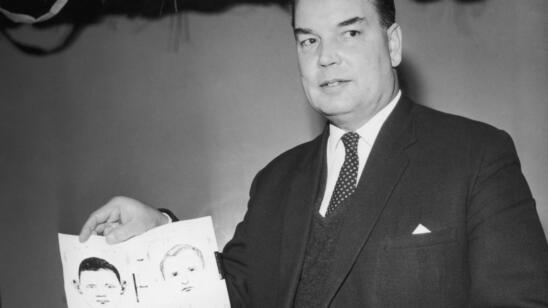Two days before Christmas in 1996, a neighbor came upon the badly beaten body of French film producer Sophie Toscan du Plantier on the ground not far from her vacation home in a remote part of Ireland. Toscan du Plantier, a blonde, 39-year-old mother, was wearing pajamas and had suffered gruesome head injuries that splattered blood up to three feet away.
It’s been 25 years since Toscan du Plantier’s violent murder in West Cork, which shocked the rural and normally crime-free region of Ireland. But the unsolved crime continues to make headlines, largely because of controversy surrounding the case’s main suspect, English journalist Ian Bailey.
Though Irish police never charged anyone in connection with Toscan du Plantier’s death, French authorities conducted their own investigation and found Bailey guilty of the crime, 22 years after it happened. Bailey remains free, however, because Irish officials declined to extradite him to France.
Who was Sophie Toscan du Plantier?
Toscan du Plantier was an independent French TV and film producer who primarily lived in Paris but often spent time at her home in southern Ireland.
Toscan du Plantier visited Ireland as a child and had fallen in love with the country’s wild landscape. In 1993, she bought an isolated cottage near the town of Schull, a coastal community in West Cork along the Celtic Sea, where she escaped her busy Parisian life to read books and take long walks.
[Watch episodes of Cold Case Files, no sign in required.]
When she died, Toscan du Plantier was married to well-connected French film producer Daniel Toscan du Plantier, who was in France at the time of his wife’s death and reportedly did not travel to Ireland to retrieve her body. He remarried less than two years after her death and later criticized the Irish police for keeping him in the dark during their investigation. Daniel Toscan du Plantier died in 2003.
“You say to yourself somewhere on earth is the person who did it,” Daniel Toscan du Plantier said in a 1998 interview with the French daily morning newspaper Le Figaro. “There is a devil in the hills of southern Ireland.”
Sophie Toscan du Plantier had one son from a previous marriage that ended in divorce. Then 15 years old, Pierre Louis Baudey-Vignaud was spending Christmas with his paternal grandparents in central France at the time of his mother’s death. He described Toscan du Plantier as “the best mother in the world.”
“I was very close to her because my parents divorced when I was one, so I lived with her,” Baudey-Vignaud told The Times.
After a neighbor discovered Toscan du Plantier’s bloodied body on the morning of December 23, 1996, it took more than 24 hours for the official state pathologist to reach the remote part of the country.
Police reportedly discovered two wine glasses in Toscan du Plantier’s kitchen and no signs of forced entry, which led to the belief that she may have known her attacker. The violent nature of her death also supports that theory, says Wendy Patrick, a longtime California prosecutor and legal analyst who has followed the case.
“She died of multiple injuries, including laceration of the brain and fractures of the skull—she was pummeled to death, she wasn’t shot with a silencer or strangled, she wasn’t poisoned,” Patrick tells A&E True Crime. “This was a brutal murder, which indicates rage. Why would someone have had such rage against her? Who would make her endure that kind of trauma—and why?”
Patrick also pointed out that Toscan du Plantier’s murderer left her body out in the open, as if he or she wanted it to be discovered quickly.
“It’s significant that there was no attempt made to hide her body,” Patrick says. “She wasn’t dragged into the bushes, she wasn’t hidden, she wasn’t tossed in a river. She was very easy to find.”
In the aftermath of her death, Toscan du Plantier’s family members lobbied for her killer to be brought to justice and set up the Association for the Truth about the Murder of Sophie Toscan du Plantier.
The Case Against Ian Bailey
Though Toscan du Plantier’s murder remains unsolved in Ireland, her relatives—and three judges in Paris—believe Bailey is responsible for her death.
Bailey lived near Toscan du Plantier’s Irish home and initially wrote newspaper articles about her murder. Then, the Irish police began investigating him as a suspect, along with Toscan du Plantier’s former lover and her housekeeper. Suspicion about Bailey grew after he reportedly admitted to three people that he had killed Toscan du Plantier. One, an editor of Bailey’s, said he claimed to have done it to revive his journalism career. (He later dismissed the remark as “black humor.”) Another, a former friend, testified that Bailey admitted killing her after she reacted badly to his sexual overtures, an account Bailey flatly denies. The writer also reportedly had scratch marks and cuts on his arms and face the day the woman’s body was discovered, and said he left the bed he shared with his then-partner Jules Thomas in the middle of the night to work on an article in the garden shed. Later, Bailey admitted to beating his girlfriend three times during their relationship, which fueled public scrutiny about his ability to commit such a violent murder.
A key witness also strengthened the case against Bailey. Local shopkeeper Marie Farrell told police she saw Bailey on a nearby bridge on the night of Toscan du Plantier’s death. She later changed her testimony and said Irish police had coerced her into incriminating Bailey.
Irish police arrested Bailey for questioning twice but never charged him in connection with Toscan du Plantier’s death, citing insufficient evidence. He was convicted of the crime in 2019 in France, where the law allows authorities to investigate and prosecute crimes committed against French citizens outside of the country’s borders. French prosecutors painted a picture of Bailey as narcissistic, egotistical and violent.
Bailey did not attend the trial and his lawyer told CNN it was a “grotesque miscarriage of justice … This was not a trial in the sense that anyone understands it.”
Still, Toscan du Plantier’s family members were satisfied with the result of the French trial.
“We won after 12 years,” Jean Pierre Gazeau, Toscan du Plantier’s uncle, told The Daily Beast. “We sought the truth and we found it. We hope Ireland will respect today’s decision. They are no longer protecting a suspect, they are protecting a murderer, an assassin.”
French authorities have attempted to extradite Bailey to France three times, but Irish courts have denied those requests. Bailey unsuccessfully sued the Irish police for wrongful arrest and sued eight newspapers for defamation with mixed results.
Bailey continues to live in West Cork, where he writes and publishes original poetry and continues to maintain his innocence.
“For 25 years, my life has been blighted by a conspiracy to pervert the course of justice by putting me in the frame for a crime I had nothing to do with,” Bailey wrote in a letter to the head of Ireland’s police force.
Related Features:
Was Gianni Versace’s Shooter a Spree Murderer or a Serial Killer?
The Murder of Bonny Lee Bakley: Case Remains Unsolved Decades Later
The Jodi Huisentruit Mystery: Missing News Anchor Case Remains Unsolved


